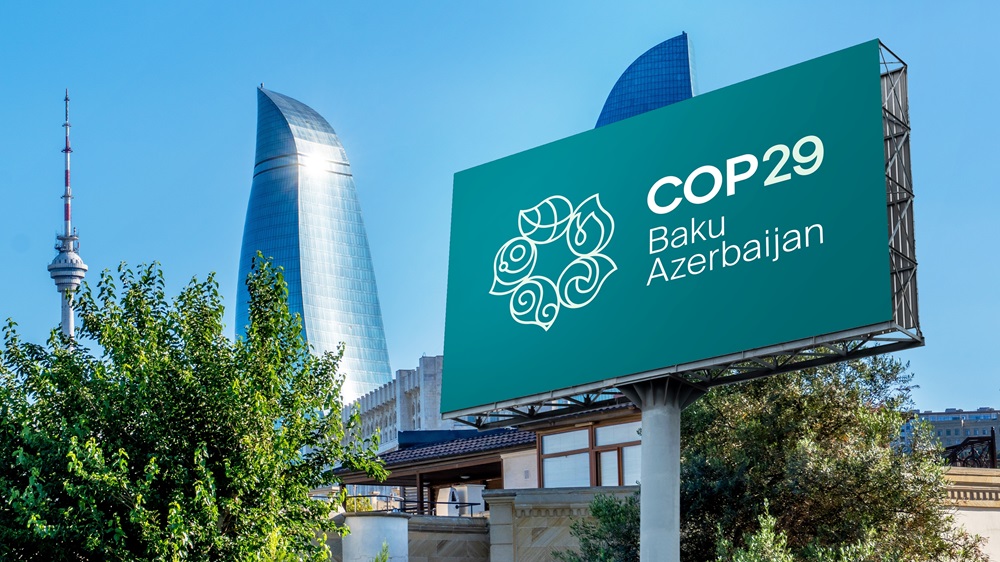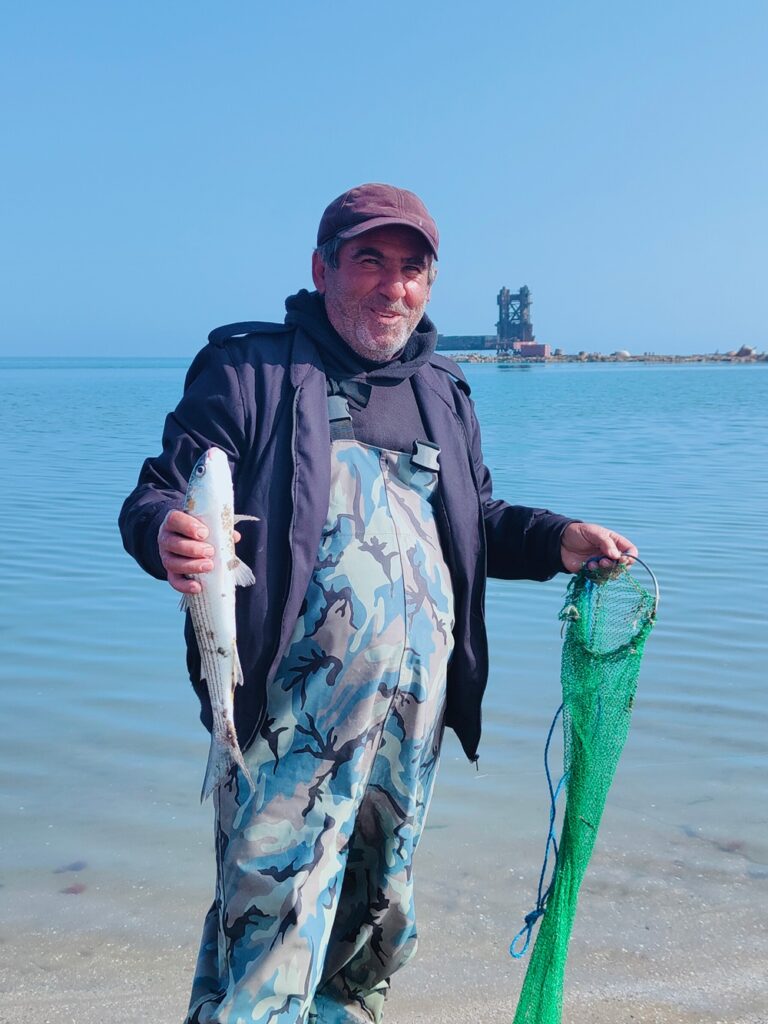
By hosting the UN’s global Climate Change conference COP29 in Baku (11-22 November 2024), Azerbaijan presents itself as a climate-responsible oil state and new political ally and donor for Small Island Developing States (SIDS) struggling with the impacts of climate change. Yet the fate of fisheries off the coast of Baku, navigating between the oil rig dotted and shrinking Caspian Sea, markedly contrasts with this posture. Drawing on research amongst Caspian fishers, this blog examines these contradictions, and the potential for local (and international) fishers to use the COP on their coast as a space for advocacy.
Just offshore of Baku, the contradictions behind Azerbaijan’s effort to re-position itself as an oil state supporting precarious coastal communities become visible. From Baku’s coast, a COP delegate can see the rigs of one the World’s first offshore oil industries, dating back to 1873. The Caspian Sea is increasingly devoid of valuable fish due to oil industry pollution and climate change. Concurrently, some 40 kilometers east of Baku, small boats of artisanal fishers can be seen navigating their shrinking sea territories.
What a knowledgeable observer can also discern from Baku’s coast, is how the ‘sea’ has receded over the past decades. In contrast to the global trend of rising sea levels, the Caspian water level is projected to fall by 9–18 meters by the end of this century. This is caused by increasing evaporation engendered by higher global temperatures, and regional anthropogenic factors such as declining influx from rivers due to irrigation and ongoing dam construction. This change, together with increased water temperatures and pollution from oil and gas extraction, leads to the disappearance of habitats for fish and the entrance of invasive species. Its level still drops by 7 centimeters annually. In some areas the horizontal retreat of the Caspian Sea amounts to 12 meters. The pace of this change is so substantial that the shallower, Northern part of the Caspian is set to disappear even under more optimistic climate change scenarios.
Oil-fueled international climate aid
The announcement that the UAE would host COP28 in 2023 raised eyebrows amongst climate activists and scientists. With Azerbaijan, another fossil fuel-dominated country has become host. Azerbaijan’s eagerness to host the global climate summit aligns with the recent attempt to reposition itself as an international donor in climate adaptation and disaster relief. As COP host, the country is now leading efforts to create a Climate Fund by oil-rich countries to help vulnerable developing nations adapt to climate change (Volcovici 2024, Eurasianet 2024). Azerbaijan started funneling some of its oil wealth into international aid at least a decade ago. Azerbaijan became a participant in the OECD’s development assistance committee in 2019, marking its nascent role as international donor, even though it continues to receive international (Western) aid. The country spent just about 50 million dollars on international aid between 2005 and 2018, representing 0.05% of its GDP. This amount is significantly less than the 115 million dollar it received itself in aid in 2017 alone (Volcovici 2024).
Ahead of COP29, Azerbaijan announced the establishment of a Climate Fund with a targeted 1 billion dollars to support developing countries’ climate goals (Volcovici 2024). The Fund, to be hosted in Baku, will be financed by 10 fossil-fuel producing countries as well as oil and gas companies. “Countries rich in natural resources should be at the forefront of those addressing climate change,” said Azerbaijan’s COP29 President-Designate Mukhtar Babayev (Volcovici 2024). Together with the UAE (Cop28) and Brazil (organizer of COP30 in 2025, and another major oil producer), Azerbaijan is driving these efforts.
Domestic climate policies versus biodiversity and artisanal fisheries
At the same time, Azerbaijan’s climate action at home is mostly still in the phase of announced ambitions with a recently established target of 30 percent of its energy renewable by 2030. While plans for a large offshore wind farm park, and dams in the Kura River flowing into the Caspian Sea might contribute to fighting climate change globally, they are likely to harm the Caspian Sea’s biodiversity and fishers’ livelihoods. The negative effect of dam building is especially strong upstream in Russia, as the Volga river accounts for 80% of the inflow in the Caspian, and 18 new Volga dams are in the pipeline in addition to the 40 current dams. This is exemplary of a tension observed in various seascapes across the world, where green maritime developments aimed at global climate targets often harm surrounding ecologies, with negative repercussions for local fishing communities (Abasli et al 2024). With wind farms’ arrival parts of the Caspian likely will be closed off for fishing, in addition to zones already inaccessible due to oil extraction.
Caspian fishers identify dam constructions, large-scale irrigated agriculture and especially marine mismanagement as potential causes of the receding coastline, which, they say, causes fish to move to deeper seas. They consider government’s policies, including quotas and a moratorium on high-value species such as sturgeon, to be inefficient and unjust. These measures hinder fishers to diversify their catch based on their own observations of fish population and migration patterns. They now must focus on a narrower range of species and catch smaller (immature) fish. Imposed quotas -only loosely based on scientific data- seem an instrument for oil companies’ new explorations for offshore gas deposits. Marine policy making, has remained top-down as in the Soviet-era, without participation of fishers.

COP29 as a space for fishers’ advocacy?
Does the COP29 present a (limited) window of opportunity, for small-scale fishers, local or international, to advocate for their concerns?
International movements of small-scale food producers do have representation at the COPs, although small. The COP with the biggest imprint of societal movements was the COP21, where the influential Paris Agreement was reached. Alongside this 2015 summit, a parallel civil society-led summit took place, with numerous food movements, including 15 representatives from fishers’ movements. The side-summit concluded with a big demonstration with over 30.000 people, including fishers (Mills 2023). Some years earlier, a significant milestone for small-scale food producers’ participation in global forums was the opening of the UN’s World Committee for Food Security (CFS) to non-state actors. It allowed agrarian and fishers’ movements to raise attention for small-scale production centered around ‘food sovereignty’ (Duncan et al. 2022, Edelman et al. 2014).
However, in the past few years, the movements’ presence in global forums is gradually being curtailed. In the CFS, corporations have markedly increased their presence, leading to the ‘priority voice’ of civil society being ‘under threat’ (Duncan et al. 2022). Increasing repression, stringent visa regulations, and the choice for authoritarian countries as hosts have stifled vibrant civil society involvement at the recent COPs. At COP28 in the UAE, the number of civil society organizations was lower than before, while agribusiness’ presence grew markedly, with approximately twice as many corporations compared to the previous year. The NGO GRAIN speaks of the ‘Davos-isation’ of the COPs, increasingly looking like the World Economic Forum with its corporate domination.
Like other societal organisations, fisheries movements’ physical participation in the COP has declined since the COP in Paris. Still, there are several fishers’ movements that manage to formulate shared concerns around climate and blue economy-induced marginalization of artisanal fishers, either through live or online COP presence.
However, within the fishers’ movements, post-socialist Eurasia is strikingly absent. Next to Azerbaijani fishers’ lack of cross-border contacts with neighboring Caspian fishers, impeded by rigid borders and shrinking democratic space, they also miss contacts with transnational movements. With a post-soviet legacy of distrust in collective action, small-scale food producers in post-socialist contexts rarely raise their voice, and mostly limit their sustainability actions to ‘quiet’, depoliticized adaptation (Jehlička et al. 2020, Visser et al. 2015). Similarly, the Azerbaijani “Baku Underwater Hunters and Fishermen’s Club” Public Union focuses on information sharing between fishers and refrains from political action.
In sum, despite Baku’s coastal location and its proximity to artisanal fishing communities, the chances for the COP29 to provide significant advocacy space for international, let alone Caspian, fishers are slim. Although two of the largest fishers’ movements, World Forum of Fisher Peoples WFFP, 75 member organizations from 50 countries, and the World Forum of Fish Harvesters and Fish Workers WFF, participate physically in the COP, Azerbaijani fishers are not involved. While state and corporate COP delegates discuss climate policies, Azerbaijani fishers are sailing past oil rigs in their small boats, further offshore in deeper -and dangerous- waters, in attempts to still catch fish in a depleting Caspian Sea.
Oane Visser is associate professor at the International Institute of Social Studies (ISS) of Erasmus University Rotterdam, and research associate at the Independent Social Research Foundation, London. He studies food and agrarian movements, climate adaptation, and digitalization of agriculture.
Nina Swen, PhD researcher at the International Institute of Social Studies (ISS) of Erasmus University Rotterdam, examines knowledge production and contestation within environmental conflicts, with a focus on fossil fuel extraction sites.
References
Abasli, I., N. Swen, N & O. Visser (2023) ‘Climate change in Caspian Sea, small-fisheries and climate adaptation’. Presentation at the ISS Workshop ‘Artisanal Fisheries, Climate Change and Knowledge for Adaptation Workshop’, 8 December 2023
Duncan, Jessica, Nadia Lambek and Priscilla Claeys 2021. The committee on World Food Security. Advances and challenges 10 years after the reform.Un monde sans faim: Gouverner la sécurité alimentaire. Paris: SciencePo Les Presses.
Edelman, Marc, Tony Weis, Amita Baviskar, Saturnino M. Borras Jr., Eric Holt-Giménez, Deniz Kandiyoti and Wendy Wolford. 2024. Critical perspectives on food sovereignty, Journal of Peasant Studies, 41(6): 911-931.
Jehlička, Petr, Mikelis Grīviņš, Oane Visser and Balint Balázs (2020) Thinking food like an Eastern European: a critical reflection on the framing of food systems, Journal of Rural Studies, 76: 286-295.
Mills, Elyse 2023. The politics of transnational fishers’ movements. Journal of Peasant Studies, 50(2): 665-690.
Visser, Oane, Natalia Mamonova, Max Spoor and Alexander Nikulin 2005. ‘Quiet food sovereignty’ as food sovereignty without a movement? Insights from post-socialist Russia. Globalizations, 12(4): 513-528.
Volcovici, Valerie 2024. Azerbaijan launches Climate Fund, seeks fossil-fuel support. Reuters, 19 July https://www.reuters.com/sustainability/sustainable-finance-reporting/azerbaijan-launches-climate-fund-seeks-fossil-fuel-producer-support-2024-07-19/
Cite as: Visser, Oane and Swen, Nina 2024. “COP29, Climate Politics and Caspian Fisheries” Focaalblog 12 November. https://www.focaalblog.com/2024/11/11/oane-visser-and-nina-swen-cop29-climate-politics-and-caspian-fisheries/